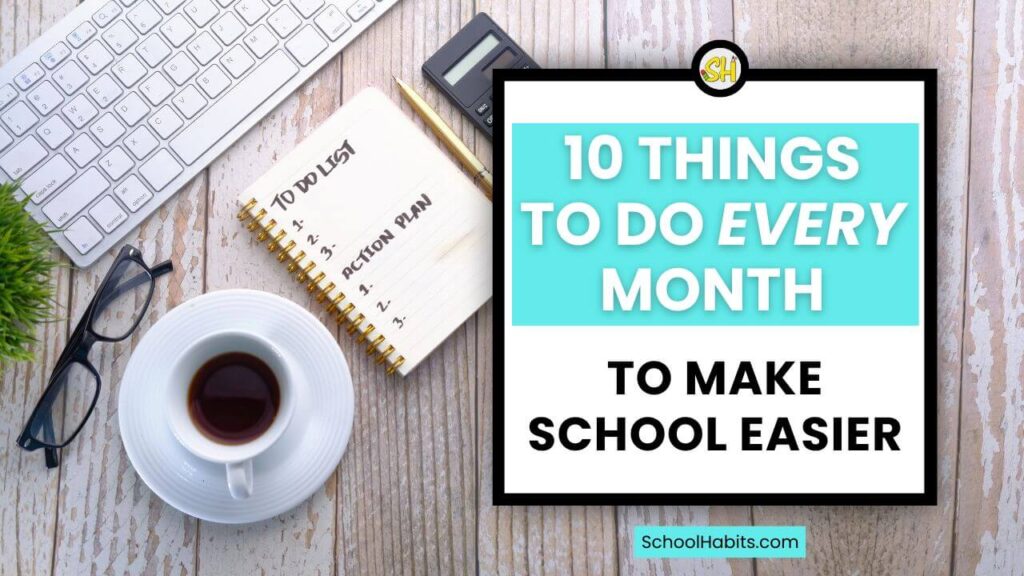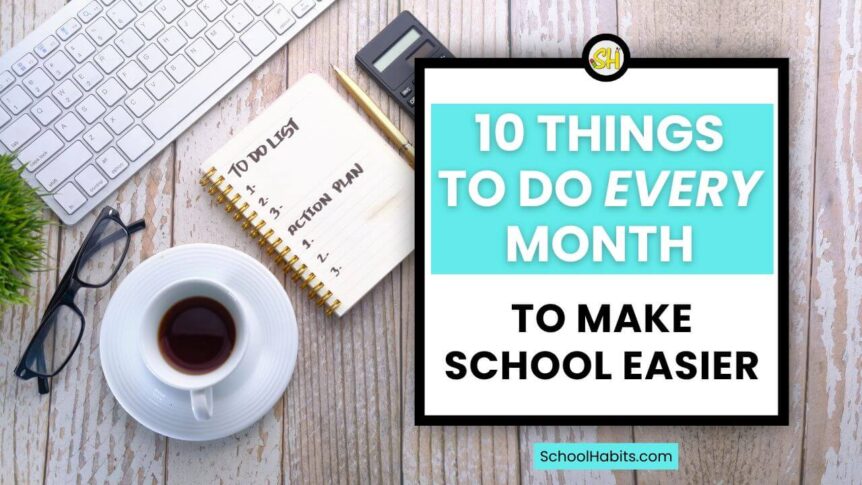
By Katie Azevedo, M.Ed.
Most students think about goals and fresh starts at the beginning of a new school year or the beginning of a new semester.
But if that’s been your approach in the past, you’re missing out on an awesome opportunity for growth. (Okay, that sounds so cheesy, but I don’t know how else to say it.)
The beginning of every month is the ideal time to evaluate your systems, performance, time, and strategy for the upcoming month.
In other words, the start of a new month is like a reset button. No matter how the last month went — good or bad — you have a chance to make things better going forward.
In this blog post, I’m going to share 10 things to do at the beginning of every month to make school and life easier.
10 Things to Do at the Beginning of Every Month to Make School Easier
If you wait until a new semester or new school year to assess your processes and progress, you risk things getting out of control before you have time to fix them.
That’s why creating a quick monthly routine helps you stay on top of tasks, grades, commitments and life…so that you feel more balanced.
Here are 10 simple things you can do at the start of every month to make school (and life) easier.
1. Evaluate and Update Your Task List
At the beginning of every month, take a look at your task lists (homework management system, assignment notebook, to-do list, etc.). The goal is to refresh your memory about what’s in there, evaluate what can be removed (because it’s complete or you no longer need to do it), and move incomplete items to a new day in the upcoming month.
Consider the following points:
- Look at last month’s tasks: what’s done and what still needs to be done?
- Move unfinished tasks forward or delete ones that are no longer relevant.
- Preview upcoming assignments, projects, or exams and break them into smaller tasks.
- If you’re new to managing your tasks and don’t know where to start, start here.
2. Declutter Your Spaces
Our spaces can get pretty nasty in a month, especially if we don’t have a solid daily cleaning habit. So at the beginning of each month, take some time to declutter, organize and reset your physical spaces, including your bags.
- Clean out your backpack: remove everything, toss old papers, throw away the junk, put stray materials where they belong, shake your bag upside down outside, and then put everything back inside.
- Tidy your study space, dorm, or bedroom: get rid of trash, put things back where they belong, and clean the surfaces.
- Flip through your books, notebooks, and binders to make sure everything is in the right spot.
- Replace missing or broken supplies.
- Here are my best tips for cleaning your school supplies.
3. Handle Your Digital Spaces
Our digital spaces can get just as chaotic and messy as our physical spaces. But our digital spaces are kind of “invisible,” which means we usually let them get pretty bad before doing anything about them.
Here are some ideas to do during your monthly reset:
- Rename “Untitled” documents. (Go into Drive and search for ‘untitled’ — and then use these tips)
- Empty your downloads folder and trash bin.
- Back up important files to cloud storage or an external drive.
- Clean up your digital desktop.
- Delete any files you no longer need, or move them to an appropriate location.
- Manage your email using these strategies.
4. Evaluate Your Schedule and Commitments
Some months are just busier than others, and that’s not necessarily a sign that something is wrong. But if you never evaluate how you’re spending your time, your schedule can get too full or even too empty.
Consider the following:
- Look at how you’ve been spending time over the past month: Are you overscheduled or underscheduled?
- Adjust your class, work, and extracurricular commitments if something feels unbalanced. Don’t forget to consider the invisible time commitments of everything you do. (I talk about that here, and it’s important.)
- Ask yourself if your current routines (like bedtime, workouts, or study times) are working for you. What can you change to make these routines easier? Do you need to create them in the first place?
5. Plan Something Interesting to Look Forward To
All work and no play is … boring and sad. Look at your calendar (we talk about calendars in the next step) and find a time to plan something that brings you joy.
You can plan a 15-minute activity or a weekend event – just as long as you put it on your calendar and commit to it.
A tip: Plan this activity for about halfway through the month, if possible. This gives you something to look forward to when the month gets long.
6. Update and Sync Your Calendar(s)
Our calendars can get pretty messy if we don’t regularly keep them updated. In this post here I teach you how to set up and use Google Calendar for school. That’s the top-performing blog post on my entire website…because the strategies work.
But in addition to your weekly or daily calendar check-ins, I suggest doing a larger calendar update at the beginning of every month to make school easier.
This is especially important if you use both digital calendars and a paper calendar, or if you share your schedule with a parent or family member.
This is also a critical step if you belong to multiple shared calendars, such as a sports or work calendar.
Consider the following ideas:
- Look at the month ahead and get a sense of whether it’s going to be a busy month or a “regular” month. Knowing this in advance can help you prepare for what’s coming.
- Add in deadlines, exams, sports events, and club meetings. Check if existing deadlines, exams, sports events and club meetings are accurate.
- Sync your calendar with roommates/parents if relevant, so you’re all on the same page.
- Sync your digital calendar with your paper calendar if you have one.
7. Check in With Your Grades
You should be aware of what your grades are most of the time. This is easy enough to do by checking whatever software your school uses for grade reporting. But once a month, it can be a good idea to dig a little deeper into your academic status.
If you’re in high school or college, you essentially only have two opportunities per year to improve your GPA: after first semester and after second semester. (By the way, here are strategies for improving your GPA.) This means that you can’t wait until the week before the semester closes to do your GPA math and determine if the numbers are what they should be.
Consider the following ideas:
- Review your current grades in each class. Are you where you want to be? Do you even know where you want to be? Is it mathematically possible to get there with the amount of time you have left in the semester?
- Identify even small red flags early (like a low test average) so you can take action before it’s too late.
- Reach out to teachers or professors if you need extra help. Again, improving your grades is a function of time and math … so you can’t wait until the last minute to get help on things you don’t understand.
8. Refresh Your Goals or Priorities
It’s totally normal for our goals and priorities to change from month to month. That’s not to say that you should change your college major every month, but your academic (and personal) goals deserve to be examined at least every four weeks. (If you don’t agree, are your goals even worth it?)
In this blog post, I teach you everything you need to know about setting and achieving your goals using a strategy called reverse engineering
With that said, consider the following ideas at the beginning of every month to make school easier:
- Revisit academic and personal goals you set earlier in the semester. You set some, right?
- Decide if they’re still realistic or if they need adjusting. It’s okay to pivot!
- Replace abstract goals (“do better in bio”) with specific ones (“review bio notes for 15 minutes, 4 times a week”).
- Remember that goals should evolve. That’s how we reach them.
9. Do a Financial or Supply Check
This tip doesn’t connect directly to school as closely as some of the other tips in this post, but it’s still worth adding to your monthly reset plan.
Remember, you’re not JUST a student. You have other things going on in your life that require your attention too, and when those areas are smooth, school can feel easier.
Consider the following areas to check in with once a month:
- Do a quick financial check. Look at your budget, meal plan, income or allowance. Are you overspending? Are you on track? Are you saving enough?
- Restock your school supplies. At the very least, rotating your daily school supplies can give you a jolt of motivation because of the novelty. (For example, swap out the pens you use each month, or change up the color of your sticky notes.)
- College students: refill your dorm essentials like laundry detergent, cleaning supplies, snacks, toiletries, etc.
10. Celebrate Last Month’s Wins
Many of the tips in this list are designed to set you up for the next month. And while that’s important to do, it’s just as important to give yourself some credit for last month’s wins.
I’m all about self-improvement and progressing toward goals, but there is significant value in stopping to smell the flowers.
So here’s how you do that at the beginning of every month:
- Reflect on what went well. Were you better at turning in assignments on time? Did you procrastinate less?
- Think about writing down your accomplishments somewhere. If that’s not your thing, can you at least think about them for a minute?
- Don’t use this time to think about how you could improve. That’s the whole point of the other nine tips. Just focus on your wins.
Final Notes About Using a Monthly Check-In to Make School Easier
A monthly reset doesn’t have to take a ton of time. In fact, you can complete most of these steps in an hour or two, total. If you spread that out over the first weekend of every month, it’s hardly any time at all…but the payoff is huge.
Oh, did you just ask for my student weekend routine? Here you go.
The point isn’t to be perfect and do all these things at the beginning of every month. Even if you do just a few of the tips in the list consistently, you’ll notice school feels more manageable. Think of it like cleaning your glasses: you don’t realize how messy and blurry things got until you clean them off. But once you do, you’re like…woahhh. (Just me? Ha.)

